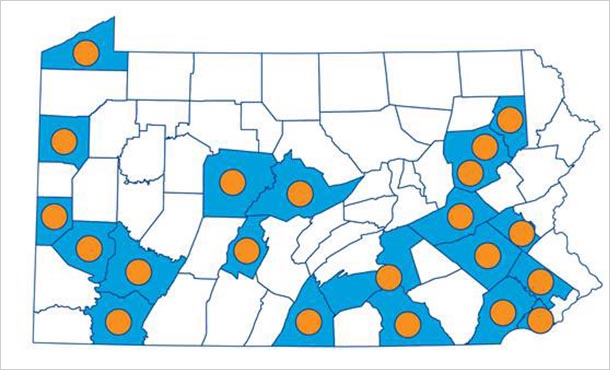
The innovation hub seed program provided grants in the amount of $50,000 per year for three years to 21 Penn State campuses for them to create innovation hubs in their communities.
Invent Penn State scales to provide impact in Pennsylvania
Trustees committee hears progress on Invent Penn State initiatives
11/14/19
UNIVERSITY PARK, Pa. — During the Board of Trustees Committee meeting on Outreach, Development and Community Relations on Nov. 14, collaborators in the Invent Penn State initiative — the Office of Entrepreneurship & Commercialization, Happy Valley LaunchBox powered by PNC Bank, Penn State New Kensington and their Corner LaunchBox, and the Office of Government and Community Relations — shared updates on Penn State’s economic development and entrepreneurship initiatives, and provided examples of the positive impact that Invent Penn State and the innovation hub seed program are having on the lives of citizens and Penn State.
James Delattre, the associate vice president for Research and director of the Office of Entrepreneurship and Commercialization, introduced the session with a variety of statistics demonstrating the impact of the innovation hubs. In only four years the hubs have provided resources to 2,516 entrepreneurs, engaged 7,143 students in entrepreneurial thinking and startups, graduated 224 startup teams from accelerator programs, resourced 208 product development projects and created 146.5 new jobs.
“The innovation hub seed grant program has delivered impact beyond what we could have reasonably expected,” said Delattre. “It’s powerful to see concepts like scaling taught to startups through the hubs and brought to bear in our own economic development environment.”
The innovation hub seed program provided grants in the amount of $50,000 per year for three years to 21 Penn State campuses for them to create innovation hubs in their communities. Since Invent Penn State started, five to six campuses have been awarded grants each year, with the first being awarded in spring 2015. The grants were predicated on forming community partnerships to create the hubs and programming needed in each community.
The innovation hubs are physical spaces located off campus, usually in downtowns, and provide no-cost resources like 3D printing and maker space, coworking space, accelerator programs, legal and intellectual property advice, and mentorship. Of the 21 hubs, 14 are LaunchBoxes, which focus primarily on helping to de-risk startup companies by providing them formal educational programming and coaching them to avoid costly common mistakes many startups teams make when trying to scale.
Delattre noted that, after receiving grants, campuses had to build out their hubs, staff and develop programming. Some hubs are just opened in 2019, and a few are not open yet.
Lee Erickson, chief amplifier for Happy Valley LaunchBox powered by PNC Bank, the second hub to open, talked about the “ingenious power of partnership” and how the long-term success of the program is dependent on the crucial support of corporations like PNC Bank, which endowed Happy Valley LaunchBox with a $1 million matching gift.
“Endowments and gifts from alumni and corporate partners are necessary for sustainability of the LaunchBoxes,” Erickson said. “They provide salary for staff and help to provide needed funding for startup teams to do prototyping, customer discovery and other lean startup activities.”
Erickson introduced a recent LaunchBox accelerator graduate, Tamela Serensits, who has used numerous Invent Penn State programs. Serensits founded Argolytics, a web-based software that helps small manufacturers assess the quality of their products. The company’s first product, Trendable, which launched in fall 2019, is an affordable quality control reporting software to alert quality managers to out-of-spec components. Serensits, who earned a bachelor’s degree in agricultural sciences at Penn State and is now pursuing a master’s degree in applied statistics through the World Campus, worked in a quality manufacturing environment and saw that small companies couldn’t afford available technologies. She used Invent Penn State resources to help her create an affordable option that would enable small manufacturers to reduce costs associated with improperly manufactured parts.
In southwestern Pennsylvania, Penn State New Kensington Chancellor Kevin Snider leveraged his campus’s seed grant funding for a coworking facility and LaunchBox in the city of New Kensington. The Corner, located on 5th Avenue, provides much needed modern membership-based coworking space. The Corner LaunchBox also provides programming for startups. Penn State New Kensington partnered with the Beauty Shoppe, a local coworking group that specializes in revitalizing spaces. This development project inspired what the town now calls the “Corridor of Innovation,” drawing small businesses to 5th Avenue, and spurring the creation of green space, bike racks and other amenities. Previously, the corridor was mostly empty storefronts.
“The Corridor of Innovation has had at least 15 properties sell in the last two years,” said Snider. “We're also working collaboratively with County officials and seeking foundation support to bring a digital innovation lab to the city. Voodoo Brewery also plans to open in December 2019 or January 2020 and has already started bringing jobs and energy into the downtown area.”
While these endeavors are beginning to see positive results and draw local New Kensington participants, the bigger story, says Snider, is that, “A LaunchBox concept designed to provide meaningful learning experiences for students and community, while contributing to economic revitalization in New Kensington, has exploded to become a large scale effort to transform a Rust Belt area into a Digital Belt.”
In 2020 Penn State New Kensington, working with the county, city, private industry, local businesses, 14 K-12 school districts, community and foundations, is developing an entrepreneurial ecosystem focused on preparing all the partners for the digital age. In doing so, the campus is developing a new model to fund exceptional learning experiences and opportunities for students while having a longstanding positive impact on economic revitalization of a region.
Vice President of Government and Community Relations Zack Moore shared examples of how they have partnered with Invent Penn State to bring positive attention to the university and demonstrate its impact to government officials through numerous events at the Capital and in innovation hubs around the Commonwealth.
“The Invent Penn State initiative is a great example of a land-grant university performing its mission in the 21st century,” said Moore. “Penn State’s Office of Government and Community Relations takes great pride in partnering with this initiative and sharing its positive impacts on communities with federal, state and local elected officials. Members of Congress, the governor, members of the General Assembly, county commissioners and many more have visited our innovation hubs and have been impressed by the thoughtful and comprehensive approach Penn State has taken to promoting economic development and entrepreneurship across Pennsylvania.”


